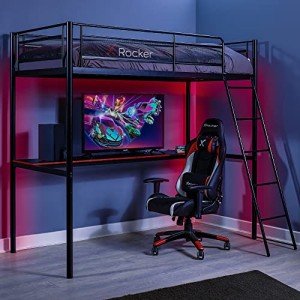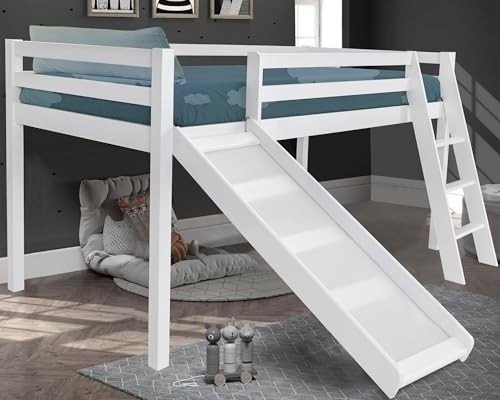
Bunk beds have actually become a popular choice for lots of households throughout the United Kingdom. They provide an efficient option for saving space, accommodating numerous sleepers, and adding an element of enjoyable to a child's space. With numerous designs, materials, and security functions available, selecting the ideal bunk bed can be daunting. This article intends to supply an extensive check out UK bunk beds, covering their types, benefits, safety standards, and acquiring suggestions.
When it pertains to bunk beds, the options are practically limitless. The main classifications include:
These are the traditional style, including two beds stacked one on top of the other. Basic bunk beds are best for brother or sisters sharing a space or slumber parties.
Loft beds rise beds without a lower bunk. This design offers sufficient space beneath for a research study location, extra storage, or play space for kids.
These beds have an L-shape design, allowing them to fit into corners or odd spaces in a room. They are frequently ideal for larger spaces and use flexibility in sleeping arrangements.
Created for larger households, triple bunk beds accommodate three sleeping areas. These beds supply vertical sleeping arrangements and can be an excellent choice for optimizing space capacity.
These versatile beds combine a standard upper bunk with a futon or couch below. This style can be utilized for sleeping or seating, making it a multifunctional option for smaller areas.
Some modern bunk beds come geared up with drawers or shelving, supplying additional storage space for clothing, toys, or books. This function is particularly useful in rooms that need organized storage options.
Bunk beds use many advantages, making them a desirable option for lots of households:
Space-Saving: Bunk beds make use of vertical space, permitting more open flooring location in smaller spaces.
Affordability: Sharing a room and acquiring one bunk bed can be more cost-efficient than purchasing different beds for several children.
Enjoyable Factor: Bunk beds offer a sense of adventure and excitement, specifically for children, making bedtime more pleasurable.
Versatile Layouts: With numerous styles offered, bunk beds can fit any space design, making sure design and performance.
Storage Options: Many styles integrate additional storage services, helping to keep spaces tidy.
| Advantages of Bunk Beds | Description |
|---|---|
| Space-Saving | Utilizes vertical space to maximize flooring area. |
| Affordability | More economical for families with numerous kids. |
| Fun Factor | Includes enjoyment to bedtime and promotes imaginative play. |
| Versatile Layouts | Combinations can fit various space configurations. |
| Storage Options | Integrated drawers and shelves assist keep products arranged. |
When picking bunk beds, safety needs to be a leading concern, particularly for kids. The UK has developed regulations to make sure that bunk beds meet specific security standards. For example:
Guardrails: Beds need to have guardrails on both sides of the leading bunk to avoid unintentional falls.
Bed mattress Size: Beds ought to work with an appropriate bed mattress size to guarantee safe use. The mattress must not surpass the top of the guardrails.
Durable Construction: Bunk beds need to be made from long lasting products to withstand regular usage, guaranteeing stability and longevity.
Weight Limit: Every bunk bed has a weight limit which should be followed for safety reasons.
Assembly Instructions: Proper assembly is vital; follow the manufacturer's guidelines closely to make sure structural integrity.
When set to purchase a bunk bed, consider the following points:
Room Size: Measure the space dimensions to make sure the picked bed fits easily.
Height Consideration: Ensure there is enough space above the leading bunk to avoid bumps on the ceiling.
Product Choice: Look for strong materials with a quality finish. Wood and metal are popular options, with each providing different looks and sturdiness.
Safety Features: Verify that the bed fulfills security specifications and has sufficient guardrails and a sturdy ladder.
Design Compatibility: Select a style that complements the existing decoration of the space.
Spending plan: Set a budget before exploring your choices, as bunk beds can cover a large cost range.
Generally, children aged six and older can sleep on the leading bunk, but constantly examine particular producer guidelines for age suggestions.
Frequently inspect for any loose screws or parts, clean the bed regularly, and ensure it stays steady.
While some bunk beds are created for heavier weights, the bulk are primarily planned for children. Examine the weight limits if considering adult usage.
A lot of bunk beds include in-depth assembly directions and all essential tools. Nevertheless, some designs might require professional assembly.
It is vital to follow the producer's standards relating to mattress thickness to make sure security and compliance with the guardrails.
Bunk beds are a versatile and practical option for families looking to make the most of space and produce a fun sleeping environment for their children. With a myriad of designs offered, it's important to think about the particular needs of the family while prioritizing security and comfort. By understanding the different types, benefits, and crucial factors to consider surrounding bunk beds, parents can make educated decisions that will boost their children's living spaces.

No Data Found!

